Do I Need a Cover Letter in 2024? Are Cover Letters Mandatory?

During the job-hunting process, you might find yourself asking “do I really need a cover letter?”
And honestly, that’s a very good question.
You might’ve heard a lot of recruiters say that cover letters aren’t nearly as important as the resume. Some recruiters even openly admit that they don’t read cover letters at all.
So, no wonder that you’re confused about whether or not you really need a cover letter.
In this article, we’re going to deep dive into the topic and teach you when you really need a cover letter (and when you don’t).
- Whether you need to include a cover letter in your application (and why)
- When to not include a cover letter with your resume
- When to really put effort into your cover letter

Do I Need a Cover Letter For My Resume
Short answer: yes , you should submit a cover letter alongside your resume.
Here’s why:
- Most job openings require you to submit a cover letter. Recruiters might not have the time to read ALL the cover letters they receive, but they will definitely read cover letters if they’re on the fence for a candidate. Besides, even if they never get to your cover letter, failing to submit one when it’s required will be a red flag.
- A cover letter shows that you’ve put in the extra effort. So, even if the recruiters don’t read them, they will know that you really want the job and that you are committed to taking all necessary steps to show you’re worth it.
- A cover letter can set you apart from other candidates. Imagine this scenario: a recruiter is looking at two candidates with the same exact professional background and resume. The difference? One submitted an A++ cover letter that showed exactly why they’re the perfect fit for the job, while the other just copied and pasted an internet template. Which one would you pick? Our point exactly!
The above being said, there do exist a few cases where a cover letter isn’t necessary and a few others where you shouldn't just submit a cover letter, but you should really put in the extra effort to make it memorable!
Ready to go through them?
When Not to Include a Cover Letter
The 3 cases where you don’t need to include a cover letter with your application are:
#1. The job opening doesn’t require one.
Yeap, in some cases, the job description will specifically instruct you not to submit a cover letter when you’re applying for the position. Needless to say, submitting one regardless of the instructions will not make you a poster child for dedication; it will just show you can’t follow instructions.
#2. You don’t have the time to customize your cover letters.
If there’s one thing that’s worse than not submitting a cover letter, is submitting a bad cover letter. What do we mean by bad? An uncustomized cover letter, or a cover letter based on a one-fits-all kind of template that you plan on mass-sending to all the jobs you’re applying for.
So, if you’re applying to many jobs and you just don’t have the time (or creativity) to write a separate cover letter tailored to each job, then just don’t write one instead of making that cover letter mistake.
#3. There is no place to upload one on the application platform.
When you’re filling out an online job application, you might notice there is no place to upload a cover letter.
Consider that a clear sign that a cover letter is not required for that particular role.
When Should You Put Extra Effort to Submit a Cover Letter
Now, as we said, the best practice is to submit a cover letter with your resume for any job, internship, or even internal position that you apply for (unless they explicitly ask you not to).
That being said, there are a few cases in which you should REALLY submit a cover letter—and put in extra effort to make it significant:
- You have important information to add. It might be a career gap, the need for a relocation, or a career change - anything, basically, that you can’t go into detail about in your resume. Your cover letter is your chance to explain it (especially if it adds significant value to your application).
- There’s a personal connection/referral. If someone has personally referred you to the company, make sure to acknowledge that in your cover letter. A personal referral means bonus points for your application, so don’t miss out on a chance to mention it.
- You have a link to the company. Did you complete an internship at the company? Or maybe you know the hiring manager or someone higher up the ranks outside of work. No matter the case, be upfront about any link you may have to the company in your cover letter. It will probably do your application good or at least show those reading it that you’re transparent.
- It’s your dream job. Without making it a love letter to the company, use your cover letter to express what this job means to you professionally and how it’ll help you thrive. Passion goes a long way!
6 Tips For a Perfect Cover Letter
The bottom line?
Overwhelmingly, a cover letter is an essential part of your job application and you should include one with your resume.
So, as you can imagine, your cover letter should be on par with your resume. Before you start writing your cover letter, here are a few tips to make the process easier for you:
- Keep it short. One page is more than enough when it comes to cover letters. Actually, the optimal length for a cover letter is between 250-400 words long.
- Follow submission instructions. In the job description, look out for specifics on the cover letter format (Word or PDF), fonts and margins, and content (such as which sections or information to include).
- Proofread your cover letter. Once you’re done writing, make sure your cover letter doesn’t have any grammar or spelling mistakes. Use spell check software such as Grammarly to be on the safe side.
- Avoid cliches. Saying you’re a “great team player” or “effective communicator” will get you nowhere. Instead, aim to show it by backing it up with your experience. Think, “I’m a great communicator” versus “I’m a great communicator, having closed 50+ sales per month at my last job.”
- Enhance your personal brand. Opt to use the same fonts, margins, colors, and style in both your resume and cover letter. In this way, you can highlight your personal brand and make more of an impression on the hiring manager.
- Use action verbs . To make your achievements stand out, use action verbs. So, instead of repeating “I was responsible for” or “I was in charge of,” you can use action verbs such as “managed” or “coordinated.”

Do you still have some unanswered questions? Here are the most frequently asked questions on whether cover letters are mandatory.
Do I need a cover letter for a part-time job?
You should follow the same practice with your part-time job application as you would with a full-time one. That means you should definitely submit a strong cover letter with your resume (unless otherwise indicated in the job description).
Do I need a cover letter for an internal position?
When you apply for an internal position within the company, you should create a cover letter to highlight your experience and professional interest in the position.
Do I need a cover letter for an internship?
Yes, you should include a cover letter with your resume when you’re applying for an internship. The cover letter should focus on your skills and strengths, your education, and your dedication to the internship program.
Not sure how to write a cover letter for an internship from scratch? This article will tell you all you need to know!
Do I need a cover letter for an entry-level job?
Yes, an entry-level cover letter is a must.
You might not have many professional or relevant experiences to list on your resume (e.g. you’re a recent college graduate or you’re changing career paths), so the cover letter is where you can convey your enthusiasm and commitment. Plus, you can also (in words) explain how your skills from your university or past career translate into the job you’re applying for.
Do employers read the cover letter or resume first?
Generally, employers will first read your resume to see if you have the relevant experience or skills for the position. From there, they decide whether your cover letter is worth reading or not. If you send your cover letter in the body of the email where you have attached your resume, though, the recruiter will probably skim through it before opening your resume.
Keep in mind that in such a case your cover letter should be perfect, especially in terms of spelling and business etiquette. If the recruiter spots a “u r” instead of “you are,” or a smiley face, they might not even get to your resume.
Want your cover letter to match your resume? We are confident that the hiring manager will appreciate the effort. Do it effortlessly by using Novorésumé's matching cover letter and resume templates !

Key Takeaways
Well, that was all on whether cover letters are mandatory in 2023. We hope that we answered all your questions on the topic.
Here’s a quick review of the main things we covered:
- In 98% of cases, you should include a cover letter in your job application. Although recruiters might not always read it, they expect candidates to submit one. A cover letter will considerably boost your chances and set you apart from other candidates with similar backgrounds and resumes.
- Don’t include a cover letter if the job opening specifies it’s not necessary, if you don’t have time to customize it to the position, or if there is no place to upload one in the application platform.
- Put extra effort in your cover letter if you have extra information to add to your resume if you have been personally referred for the job, if you have a link to the company, or if you’re applying to your dream job.
Related Readings:
- How to Start a Cover Letter
- How to End a Cover Letter
- How to Address a Cover Letter

To provide a safer experience, the best content and great communication, we use cookies. Learn how we use them for non-authenticated users.
Finally, an Answer To: Are Cover Letters Still Necessary?

The cover letter is a contender for job seekers’ most hated part of the job search. Personally, when browsing job boards, I’ve always gravitated toward the postings that said “cover letter optional” or didn’t mention one at all— and I’m a writer. When you’re deep in a job hunt—particularly one where you feel like you’re throwing applications into a black hole—cover letters might feel pointless. It’s not like we’re mailing out our resumes anymore—so what is the letter covering? Does anyone read cover letters anymore? Are cover letters even necessary at all, or are they outdated?
I set out to find the answer by speaking to experts, combing through studies, and putting out a call to hiring managers and recruiters to find out how they handle cover letters when they’re making hires.
Does Anyone Still Read Cover Letters?
In a 2020 survey of 236 hiring managers and recruiters, ResumeGo found that 87% of respondents read cover letters. Only 13% did not. I got similar answers in my own research. The overwhelming majority of recruiters and hiring managers I heard from—folks who work across career functions and industries—told me they do still read cover letters in some capacity.
The most common answers I got were that hiring professionals read cover letters:
- For all qualified applicants
- For any candidates they’re considering moving to the next step of the hiring process
- For any candidates who are on the border of being moved forward
- For any candidates whose resumes raised questions for them
So if you’re submitting applications to any opening you come across and apply for a manager-level position as an entry-level candidate, or upload a teaching-focused resume for an accounting job, don’t be surprised if your cover letter gets skipped. For the most part, if your resume doesn’t even come close, no one is going to bother reading your cover letter, says Muse career coach Eliot Kaplan , who spent 18 years as VP of Talent Acquisition at Hearst Magazines before founding Eliot Kaplan Coaching .
This does mark a shift in how hiring professionals use cover letters, however. Traditionally, the cover letter was the cover page for your resume (hence the name), so its purpose was to convince the reader to look at your resume. Now, your resume usually (though not always) gets looked at first, and your cover letter is there to further persuade the reader to move you to the next round in the hiring process. So while cover letters are serving a different purpose now, they’re still being read and considered.
Unsurprisingly, everyone I heard from involved in hiring for jobs where writing, editing, and/or messaging is a key skill said they read and considered cover letters. For example, Glen Muñoz, who has been in marketing and operations for over 30 years, says that he reads all cover letters for candidates who meet the minimum requirements because the cover letter serves as a sample of their written communication skills, which are of course vital to whether or not you can do these jobs. Kaplan also said this was true in journalism.
Outside of these careers, cover letters are still widely read by the hiring professionals I heard from. Hiring managers, recruiters, and HR professionals across sales, finance, healthcare, accounting, customer service, and yes, even tech indicated that they read and considered at least some—if not all—candidates’ cover letters. “If I didn’t read [an applicant’s cover letter], there’s another reason that I’m not going to hire them,” says Karen Gordon, VP of Growth for Goodshuffle Pro , who hires for various roles including software developers. Those who said they read cover letters at all usually read them for all positions even if they’re hiring across different functions.
Employers also read cover letters across experience levels. “I have found the cover letter to be an important arsenal in a job seeker’s toolbox, even those seeking higher-up roles,” says Paul French, founder and managing director of Intrinsic Search , a recruiting firm specializing in executive positions for SaaS companies. At the other end of the spectrum, Kaplan says entry-level candidate’s cover letters are useful for hiring professionals to see how your education, part-time jobs, and other less traditional sources of experience connect to the job you’re applying for: “If you have less of a track record, you’re going to have a little more vamping,” and your cover letter is the place that it happens.
In my research, I noticed that the hiring professionals most likely to say that they skipped or skimmed cover letters to save time identified themselves as recruiters. Respondents also mentioned knowing other hiring professionals who did not read cover letters, most often recruiters. In its 2020 Recruiter Nation Report , based on a survey of 806 recruiters conducted by Zogby Analytics, Jobvite found that just 27% of recruiters consider cover letters when evaluating a job application.
And it makes sense. Often a recruiter’s primary job is to find and screen candidates for open positions, meaning they might be looking at hundreds of applications a day for a range of jobs. However, recruiters are usually not the only person seeing an application before a final hiring decision is made. They’re just the first step. So a recruiter not reading your cover letter doesn’t mean that someone else–like the hiring manager or a future member of your team—won’t. For example, tech recruiter and Muse career coach Steven Davis admits that he doesn’t read every cover letter as a recruiter, but as a coach, he still encourages his clients to “write a concise, enthusiastic cover letter” because he believes they’re valuable pieces of a job application that can help you land a later-round interview.
It’s important to note that while the 2020 Recruiter Nation report found that only 27% of recruiters considered cover letters in their decision, that’s up from 8% in 2017—a threefold increase in as many years. So the number of recruiters who read and consider cover letters is actually growing, not shrinking.
Do Cover Letters Help You Get a Job?
“For 80-90% of jobs I still believe in the cover letter,” Kaplan says. Cover letters help make the case for you as an applicant and can provide valuable information to recruiters and hiring managers, not only through their content but just through the fact that you took the time to write one at all.
In ResumeGo’s survey of recruiters and hiring managers, 65% of respondents said they are “materially influenced” by cover letters in their hiring decisions. ResumeGo also conducted a field experiment, submitting fake applications to over 7,000 job postings with either no cover letter (leaving the field blank or writing in “N/A” when needed), a generic cover letter, or a tailored cover letter that gave details on how the applicant matched the company culture and job description.
After 30 days, applications with tailored cover letters were 53% more likely to have gotten an interview callback than applications with no cover letter, and even generic cover letters were 17% better than no cover letter at all. Meaning, yes: Cover letters do still matter and they can help you get to the next round in the hiring process.
“One of the biggest takeaways was that tailored cover letters are far superior to generic cover letters when it comes to boosting a job applicant’s chances of being hired,” says Peter Yang, CEO of ResumeGo. Tailoring a cover letter doesn’t necessarily mean starting from scratch each time. You’re likely applying to a lot of similar jobs, so you might create a basic template for yourself, but add to it based on the job and company, Kaplan says. He estimates you can keep about two-thirds of your cover letter the same across most positions and customize the remaining third.
Read More: The Best Cover Letter Examples for Every Type of Job Seeker
When Do You Absolutely Need a Cover Letter?
There are some situations where you should definitely include a cover letter or you’ll greatly increase the risk of being rejected when you otherwise might’ve had a chance.
Many job applications require a cover letter and in those cases, if you want a real shot, you have to write one whether you want to or not, Kaplan says. You don’t want the first message you send a prospective employer to be that you can’t or won’t follow directions.
You might also have some other signal that a cover letter is crucial to a specific role. Before I applied to my current job at The Muse, I saw that my future manager had tweeted out the job listing. In the tweet, she said to include a cover letter; they’d be using it to gauge my writing skills and it was a chance to sell myself for the role. So of course I wrote one! In addition to social media, this signal could also come from conversations with current and former employees of the company, or the job description might stress the cover letter’s importance or ask you to include certain information in it, even if the online application doesn’t have a mandatory slot for it.
But job seekers don’t always get a giant flashing neon sign declaring that a cover letter is crucial for a particular position. In some cases, the cue that a cover letter is extra important will come from your side. If you have any special situations surrounding your candidacy or there’s anything on your resume or application that needs additional context to be understood, writing a cover letter is really in your best interest. If there’s something on (or not on) your resume that might be a red flag to people reading, your cover letter can keep your application out of the rejection pile.
According to the experts, some special situations that can be explained by a cover letter include:
- Career transitions : If this is going to be your first job in a new of type role or a different industry, or if you’ve followed a non-linear career path, a cover letter can explain why you want this job and how your past experiences have prepared you for it. It’s also an opportunity to highlight how your transferable skills will help you in your next job. For example, Kaplan once coached a “management consultant who wanted to become a fighter pilot.” She wrote a compelling story about her background, how she overcame obstacles in her past jobs, and how she would do that in the air.
- Employment gaps: Whether this will be your first job after your employment gap or you have one further back on your resume that you’re worried might raise eyebrows, including a cover letter gives you an opportunity to explain.
- Out-of-area applications: If you’re moving and hoping to secure a job before you get there, you can explain that in a cover letter so hiring managers understand why your application is coming from a different geographic location.
- Personal connections to a company or job referrals: If someone in your network referred you to a job or you have another connection to the company, this goes in your cover letter, not on your resume, Kaplan says.
Ultimately, it’s up to you whether or not to write a cover letter. In the ResumeGo survey, only 26% of respondents said they “punished” or “deducted points” from candidates who didn’t include a cover letter when the job posting didn’t require one, and in its 2018 Job Seeker Nation Study , Jobvite found that only 45% of respondents had submitted a cover letter for their current or most recent job. So you can definitely get a job without a cover letter. But ask yourself this: Why would you skip out on the chance to make your application even stronger?
Skip navigation

- Summer Updates
- For Employers
- In the Know
- Make An Appointment
- Internships
- Employer Connections
- CCE Programs
- Funding Programs
- Drop-in Hours
- Career Counseling Appointments
- Practice Interviews
- Programs & Services
- Design Your Next Steps
- Resumes & CVs
- Cover Letters
- Negotiating
- Career Advancement
- Graduate School
- Premium Resources
- Communications & Media
- Engineering & Technology
- Environment & Sustainability
- Financial Services
- International Affairs
- Non-Profits & Social Justice
- Psychology, Counseling, & Social Work
- Ways to Gain Experience
- Career Assessments
- Connect With Alumni
- Student Experiences
- First-Generation/Low-Income Students
- International Students
- Students with Disabilities
- Veteran Students
- LGBTQ Students
- Visiting Students
- Students of Color
How and Why to Write a Great Cover Letter
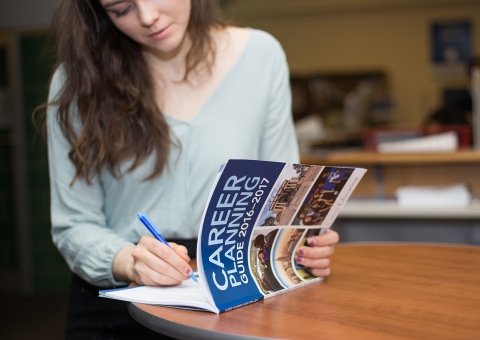
A cover letter is a one-page business letter that you submit when applying to a job, along with your resume. As a piece of persuasive writing, your cover letter will aim to convey to the employer why you’re a great candidate for the role.
What is the purpose of a cover letter?
Your cover letter complements your resume by making it easy for the employer to see how your experience and interest connect to the position. Your goal is to convince the employer to interview you.
With your cover letter, you’ll aim to:
- Highlight your qualifications: You’ll show how your skills and experience relate to the employer’s needs for a specific position.
- Showcase your motivation: You’ll demonstrate your enthusiasm for the specific position and the organization.
- Reflect your voice and written communication skills: You’ll give the employer a sense of your personality and writing style.
When should I write a cover letter?
Not all jobs require cover letters. So, how do you decide whether to submit one?
Submit a Cover Letter when…
- The posting explicitly requests that you do so
- You’re applying to an opportunity at a mission-driven organization
- You think that doing so could provide important information to the employer that they wouldn’t get from your resume
Consider Submitting a Cover Letter when…
- It’s marked “optional” in an application, and you have the bandwidth to do so
- You have content that you can easily recycle or repurpose into a tailored cover letter
No Need to Submit a Cover Letter when…
- A posting specifically tells you not to submit one
- There’s no way to submit one in an application portal, and doing so would require a serious workaround
If you’re applying to several similar opportunities, creating a draft cover letter in advance, geared toward that type of opportunity, can be a helpful way to save time in your actual application process.
How do I write a cover letter?
Your cover letter should articulate your qualifications and motivation for the position. Read the job description closely and research the organization. As you craft your cover letter, use examples that demonstrate your relevant skills, knowledge, and interests. The cover letter should be concise, clear, and well-organized.
Before Writing
Research the employer.
Learn enough about the organization to articulate why you are a strong fit for that firm.
- Review the firm’s website and LinkedIn page.
- Speak with current or previous employees.
- Read articles and social media for current news.
Analyze the job description
Look for skills, duties, and qualifications of the job so you can design your letter to match these as much as possible.
Reflect on your experience and motivation
Identify skills and personal qualities you have developed which will be useful in this role. Ask yourself:
- What attracts you about this role/company/industry?
- What have you have done in your work experiences, classes, internships, activities, projects, volunteer work, travel, etc., that is similar to the duties required of the job?
Cover Letter Structure
As a business letter, the cover letter should include:
- Heading: Include your name and contact information in the same format as your resume
- Salutation: Address your letter to the specific individual who can hire you, if this is known. If the name is not included in the job description, address the letter to the Hiring Manager or title mentioned in the job description.
- Body Paragraphs: Discuss your experiences, interests, and skills to show the employer how you can add value to their team. See the section below for more guidance.
- Signature Line: Include a closing and your name.
The cover letter should be one page, about three or four paragraphs, and single spaced. Use 10-12 point font and one inch margins.
When applying online, upload your cover letter as a PDF file, unless another format is specified. When sending your resume and cover letter by email, you may write a short note or paste your cover letter in the body of your email (without the address header) and also attach the PDF file.
Cover Letter Content
Your cover letter should answer who, what, when, where and why you are applying for the opportunity.
Introduction
State the position for which you are applying. If you have a referral or spoke with someone from the company, you can mention it in the introduction. Provide some basic information about yourself; this can include your class year and what you’re studying at Columbia. Briefly outline why you’re interested in the organization and what you bring in terms of relevant experience and skills.
Body Paragraphs
These paragraphs will highlight your qualifications and strengths that are most relevant to the organization and position. Use the job posting and your research as clues to determine what the employer is seeking in a candidate. Have your resume beside you and reflect on what you want the employer to know about you. Are there experiences you want to expand upon that demonstrate your understanding of the role and ability to do the job requirements?
Structure the paragraphs based on relevance, not chronology. Lead with your most relevant skill or strongest experience.
Start each body paragraph with a clear topic sentence. This can highlight a key skill set, a transferable experience, or a core area of knowledge you’ve built through your studies. Walk the reader through a project or experience, integrating the relevant skills you used and qualities you demonstrated. Provide details about your accomplishments and impact. Connect how these experiences have prepared you for this role and why you are motivated to do this job. There is no need to apologize if you feel you lack experience; focus on the accomplishments that you have.
Recap what you would bring to the organization and your interest in the position. Thank the employer for their consideration. Keep your tone positive and enthusiastic.
Check out our example of how to structure your cover letter content .
Editing Tips
Use our Cover Letter Checklist to make sure your format and content is in line with best practices.
- Ensure that the content reflects the requirements in the job description
- Keep the cover letter concise, at one page or less
- Correct any errors in grammar, sentence structure, and spelling
- Use the active voice
- Avoid beginning too many sentences with “I”
Privacy Policy Accessibility Notice of Non-Discrimination Terms of Use
- Skip to Content
- Skip to Footer
Resume Genius
The World's Smartest Resume Builder
Monday to Friday, 8AM – 12AM (Midnight) and Saturdays and Sundays, 10AM – 6PM EDT (866) 215-9048
Blog Cover Letter Help What to Include in a Cover Letter
What to Include in a Cover Letter (& What to Leave Out)
Your cover letter needs to include a few key elements in order to make a positive impression on hiring managers. We outline the parts of a cover letter, give examples, and explain what not to include in a cover letter.

As featured in *
Curious about exactly what a cover letter should say? Have you looked at a good cover letter sample and are still unsure what to include and what to leave out?
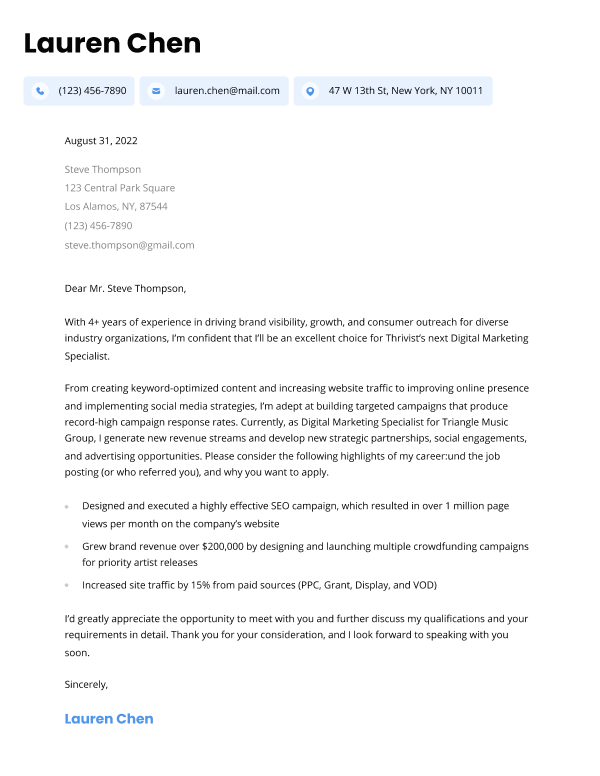
Our free-to-use cover letter builder can make you a cover letter in as little as 5 minutes. Just pick the template you want, and our software will format everything for you.
What to put in a cover letter in 2024
A great cover letter consists of the following components:
1. Your name and contact information in a header
The hiring manager needs to have your contact information. Without these details, they have no way of inviting you for an interview.
The most eye-catching way of adding your contact information to your cover letter is by creating a large cover letter header , which includes your name (in the largest font on your cover letter ) and the best ways to contact you. Here’s an example of a clear, well-designed cover letter header:

Even if you’ve included your contact details on your resume, repeat them in your cover letter in case the hiring manager doesn’t have your resume on hand when they decide you’re the candidate they want to interview.
In 2024, adding your home address is unnecessary because recruiters contact candidates by either email or phone.
2. A polite cover letter greeting (salutation)
You should also greet the reader of your cover letter with a polite salutation. “Dear Mr./Ms./Mx. [Hiring Manager’s Surname]” does the trick:
Dear Ms. Hernandez,
Using an actual name is better than writing “Dear Hiring Manager” or “ To Whom It May Concern ” because it shows you aren’t sending out applications in bulk, and likely have actual interest in the job you’re applying for.
Find the hiring manager’s name on the company website or on LinkedIn. If all else fails, call the company and ask for the hiring manager’s name, and explain that it’s for addressing your application if asked.
Then, begin your cover letter with a brief introduction that contains the following details:
- The position you’re applying for
- How you found out about the opening
- Why you’re excited to apply
When starting off a cover letter , keep your introduction concise and attention-grabbing so the hiring manager will want to keep reading.
3. Specific examples of achievements
Now you’ve set up your cover letter, it’s time to write the body text.
To make a strong impression, mention an important project or contribution from your past work or academic experience that’s related to the role you’re applying for. Then, explain exactly how you contributed to the company’s success.
Instead of just rephrasing the work experience on your resume , your cover letter body paragraphs should use fresh examples or add more detail to something you briefly mentioned.
A great way to make your achievements stand out is adding some hard numbers to prove exactly how much impact your work had. Finding this data doesn’t have to be difficult.
Some common quantifiable achievements include:
- Number of customers served in a given time period
- Percentage of positive reviews
- Dollar amount of sales
- Percentage of increase in profit
- Number of people managed or trained
Here’s an example of how one candidate successfully backed up their achievements with evidence:
As a Sales Assistant with TRP Insurance Inc., I ranked within the top 10 salespeople company-wide for 2 years in a row, and in my first year, I successfully expanded our customer account base by 18% through networking and client referrals.
Including this data shows the hiring manager what you can achieve on the job. These numbers give them a glimpse at how your output will improve their company’s performance, and whether you’d be a good fit on their team.
Quantifying your accomplishments is especially crucial when writing a cover letter for an internal position, because the hiring manager will ask themself if you’ve been an asset to the company since you were hired.
4. Reasons why you’d be a good fit at the company
To write a great cover letter, you need to put in a little effort (but trust us, it’s worth it).
Start by going to the company’s website. On the site, see if you can find a corporate culture webpage or some form of “company mission” page. Take a look at this example from KPMG :
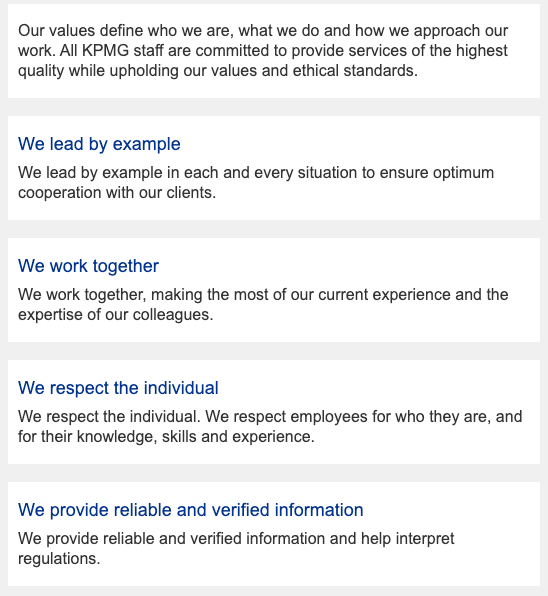
KPMG’s executives emphasize specific values, so you’d want to give examples that highlight integrity and teamwork skills if you were applying here.
WD-40 Company , on the other hand, has a less formal corporate culture:
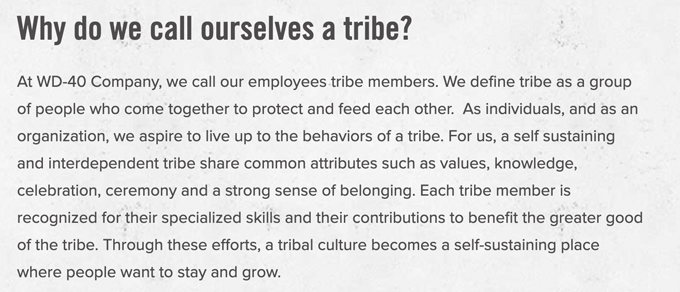
The company describes its workers as a tribe, emphasizing the bonds it wishes to develop between employees.
If you were applying here, you could mention what you could bring to the “tribe” and showcase your people skills in your cover letter.
Showing familiarity with the company makes you seem invested in the opportunity, and hiring managers take notice.
5. Proof you can help the company reach its goals
As well as researching a company’s culture, investigate its performance, history, and ambitions. If you prove you’ve researched these details in your cover letter, you’re more likely to catch the hiring manager’s attention.
A good place to start your research is on a company’s website. Use its website to find out about product lines and recent news. For example, you might discover it just launched a product similar to one you used to work on.
Then use some of the information you gathered as a starting-off point in your cover letter.
Mention how you can bring expertise from a similar project to the company’s new endeavor, or give an example that shows how you’d contribute something new to the team.
Here’s how one candidate used their foreign language skills to appeal to an internationally-expanding company:
As a multinational organization, your company has connections with several other businesses across the globe. I believe my fluency in Spanish and English — two widely spoken languages — will be crucial in establishing trust and solid, working relationships with clients in other countries.
6. A cover letter ending that requests an interview
Wrap up your cover letter by asking the hiring manager to invite you in for an interview. An interview request may seem forward, but it also shows confidence and helps drive the urgency of your application home to the reader.
Here’s an example of an effective ending from a legal assistant cover letter sample :
After reviewing my resume, I hope you’ll agree that I’m the candidate you’ve been looking for. Please contact me by phone (775-034-2512) or email ([email protected]) when you’d like to set up a time for an interview. I look forward to elaborating on how my specific skills and abilities will benefit [company name]!
7. Your professional sign-off and signature
Your cover letter closing is not a time to get creative. “Sincerely” is always a safe bet for wrapping up your cover letter..
If you’re not sold on “Sincerely”, “Respectfully” and “Best” are also good options.
Sign your cover letter by hand if you want it to add a personal touch.
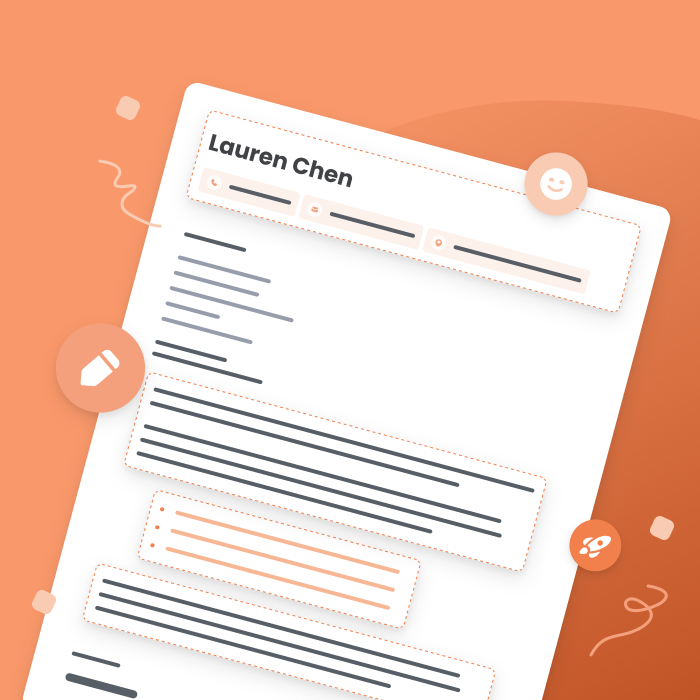
How to write a cover letter
Dread writing cover letters? Read our guide to learn how to write a great cover letter that convinces hiring managers you’re the ideal person for the job.
What not to include in a cover letter
Just like when you write your resume , avoid mentioning anything that doesn’t demonstrate your suitability for the job you’re applying for. You have limited space to win over potential employers, so don’t discuss any irrelevant achievements or experiences, even if they’re impressive.
Also avoid any disclaimers like “although I have limited experience…” because it could make you seem under-qualified. False modesty doesn’t belong in a cover letter, so keep your tone confident and focus on your most valuable qualifications.
Lastly, you should never put negative remarks about your previous employer in a cover letter because it gives hiring managers a bad impression of your ability to work well with others, even if your criticisms are well-deserved.
In summary:
- Political opinions
- Criticisms of previous employer
- Irrelevant information
- Religious views
- Disclaimers (what you lack)
- Lies (even exaggerations!)
- Salary expectations
- Too much flattery
What to include in an email cover letter
An email cover letter contains most of the same elements as a regular cover letter, but you also need to include a subject line.
Your subject line should be something similar to this:
Application for [Position] role
When writing an email cover letter, you also don’t need to include the hiring manager’s name and address.
Here’s what an email cover letter will look like:
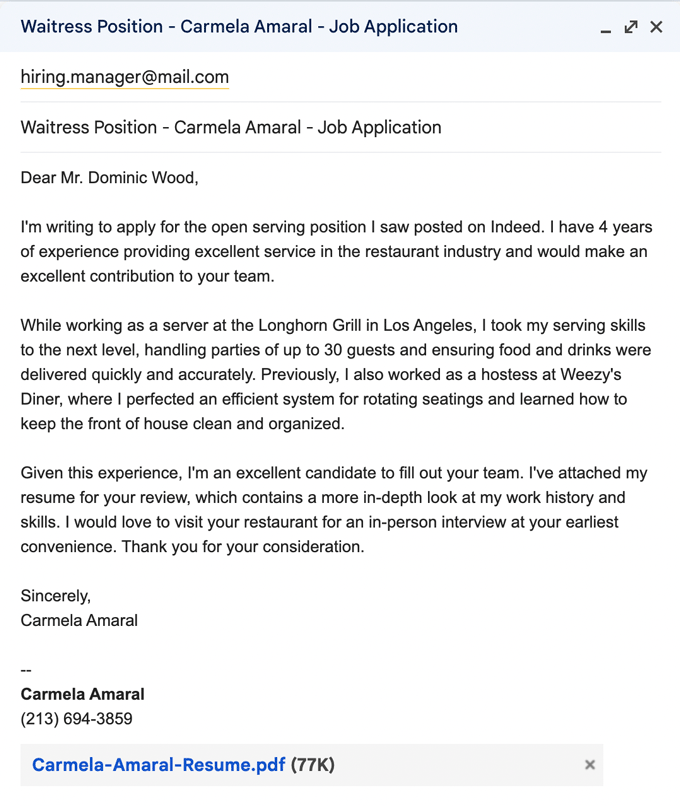
Don’t forget to attach your resume and full-length cover letter to your email. An email cover letter is usually just a couple of paragraphs informing the hiring manager you’re applying for the role, and telling them your full cover letter and resume are attached.
Need some help getting started? An AI cover letter generator can help you put together a cover letter that’ll catch the hiring manager’s eye in minutes.

Emily Crowley
Career Advisor & Senior Content Writer
Emily Crowley loves helping job seekers overcome obstacles to advance their careers. She graduated from George Mason University with a degree in Foreign Language and Culture and relocated to Taipei shortly after. As a writer and career advisor, she takes a particular interest in empowering young professionals through practical knowledge and advice on topics like resume writing, interviewing, and navigating career changes. Emily’s career advice has been featured in online publications such as Global Trade Magazine and Parade. For media-related queries, she can be reached at emily [at] resumegenius [dot] com.
What to Include in a Cover Letter
Click to rate this article
4.3 Average rating

Related Articles
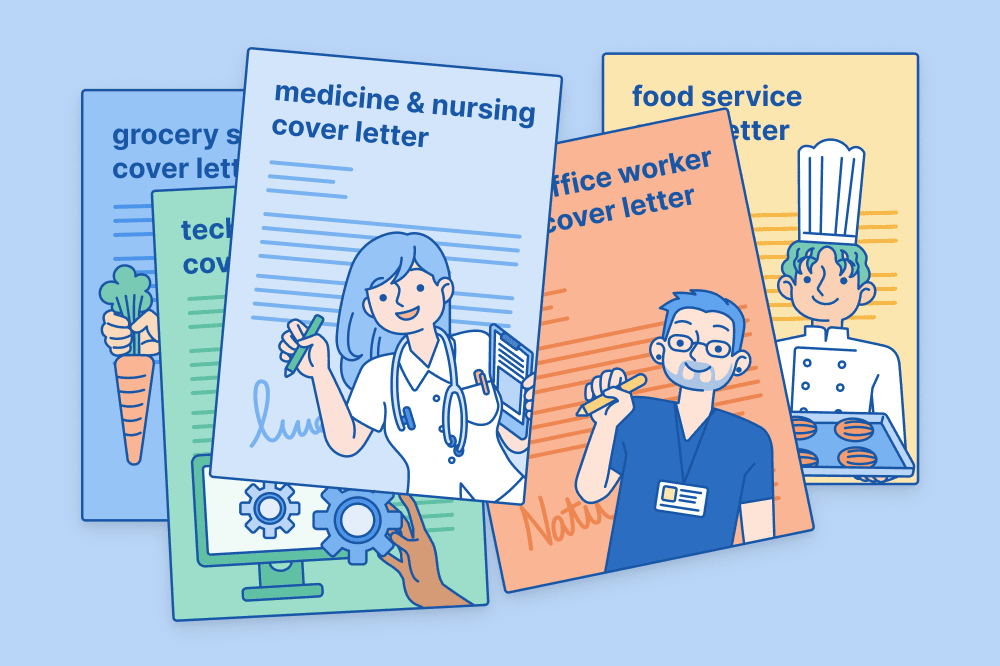
Cover Letter Help

Conrad Benz, Hiring Manager
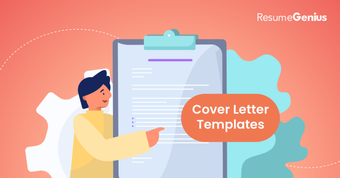
Geoffrey Scott, CPRW
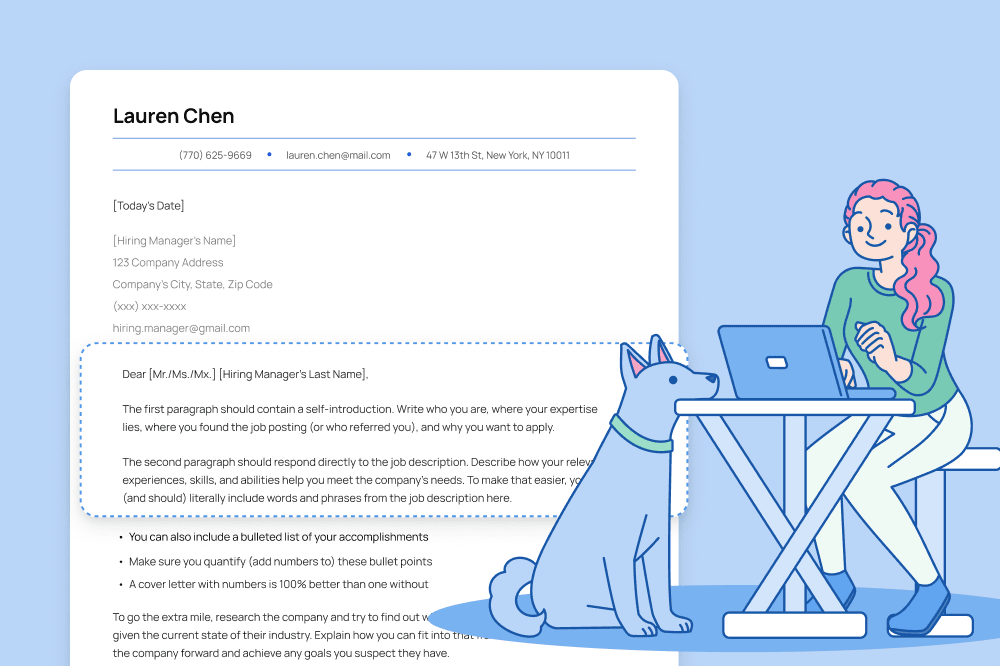
Corissa Peterson
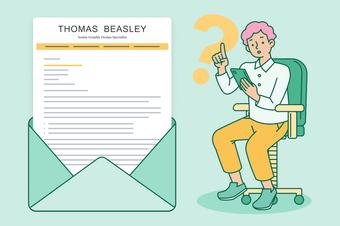
Rebecca Tay, Ph.D.
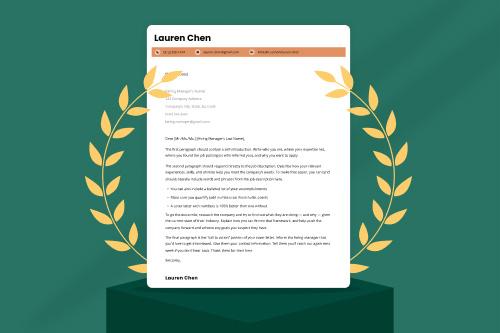
Ida Pettersson
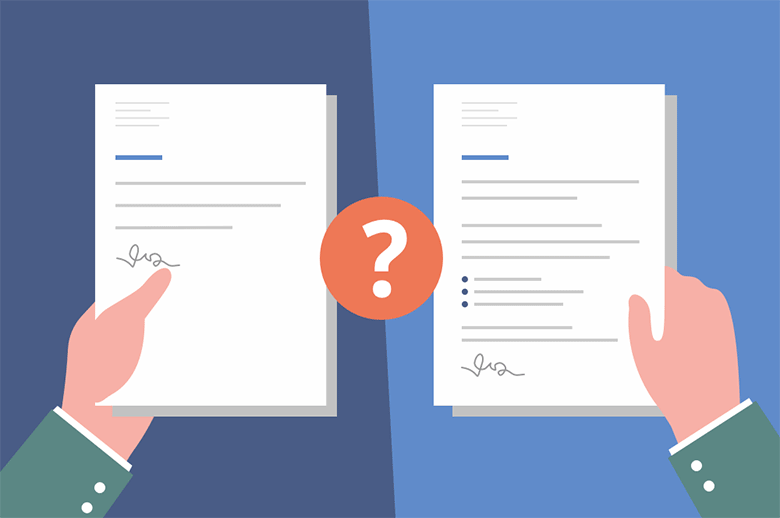
We are aware of a global phishing scam with employees from companies impersonated across email, WhatsApp, and Telegram. We are confident that no PageGroup system has been breached. Find out how to protect yourself and the signs to look out for
What is a cover letter and why are they important?

Download your Job Applicant Toolkit
Want more tips on navigating your job search and landing your dream role?
Is your CV updated and ready to go?
Submit today to become discoverable to all our live roles.
Related articles

This website has app functionality. Add it to your home screen for fast access and offline features.
More From Forbes
Do we really need to write cover letters in 2023.
- Share to Facebook
- Share to Twitter
- Share to Linkedin
Composing a cover letter on the laptop
The earliest record of the cover letter for employment dates back to the 1950s according to The Atlantic, and has been used ever since as an addition to resumes, for candidates to prove to potential employers their desire and eligibility for posted roles. In recent years, however, especially since the post-pandemic unemployment upheaval, the choice of whether or not to include cover letters as part of the job application process has been a topic of contentious debate, and has left most candidates confused as to whether or not to include them, especially if the employer has not specifically requested them.
In a recent LinkedIn poll I conducted, more than 70% of respondents (a mix of recruiters, hiring managers, and candidates) voted that cover letters are no longer necessary as part of the shortlisting process. However, across the Internet, there were others who advocated its use, provided the right conditions were met.
The question remains, Should we write cover letters for jobs, even if they're not mandated in the application process?
When cover letters are needed
Emily Meekins , CEO and Founder of talent consultancy Workstrat, points out that she rarely reviews cover letters. "85% of the time, I can learn enough from your resume and LinkedIn profile. The application/interview process is time-consuming enough without a cover letter. I'd prefer candidates save their time and reapply it to other areas of their search." However, Meekins adds that she would look at a cover letter if she is on the fence and needs more information to help make an informed decision, or to check for quality of writing and communication skills.
I spoke with Yulia Saf , Founder and CEO of MissTourist.com, who has hired and led a team of up to 12 employees remotely, and asked her to share her experiences and insights on this topic. Saf revealed that cover letters have significantly impacted her decision to hire candidates on several occasions, noting that "candidates who include a persuasive cover letter often stand out during the shortlisting phase, as it provides insight into their passion and determination for the role."
Best High-Yield Savings Accounts Of 2024
Best 5% interest savings accounts of 2024.
Writing with laptop
Maurizio Petrone , founder of the remote-first digital media start-up MustReadQuotes.com, has been hiring talent for over 15 years, and highlights that from his experience, "cover letters have played an essential element in hiring decisions, even when we didn't specifically request them. Out of the hundreds of candidates we shortlisted over the past five years, about 70% included cover letters in their applications. These letters helped shed light on their motivations and gave a better insight into their soft skills - things often not immediately evident in resumes."
Cover letters are a fantastic way to explore beyond the confines of one's resume and tell a compelling narrative about your career journey, motivations and aspirations for the job, and even transferable skills, especially for those facing perceived barriers in the workplace. This makes it an excellent choice for those making a career pivot or transition.
As Thomas Codevilla , business attorney, Co-Founder and hiring manager at SK&S Law Group points out, "A well-written cover letter allows candidates to tell a compelling narrative about their experiences and how they can uniquely contribute to our organization. On the hiring side, I know that ATS often play a role in screening applications. What many candidates might not realize is that incorporating relevant keywords from the job posting into their cover letters can significantly improve their chances of getting past this initial screening stage.
"As a recruiter, I appreciate it when candidates address their cover letters to a specific individual or mention a mutual connection within the company. It not only shows that they've done their research but also increases the likelihood that their application will catch my attention.
"A cover letter gives candidates the opportunity to address any potential red flags in their resume, such as employment gaps or career changes. When a candidate proactively explains these issues, it shows their transparency and willingness to provide context, which can positively influence my perception of their application."
Best practice when crafting your cover letter
While cover letters are a great way to demonstrate your value to a potential employer, you should always ensure that it actually delivers real value and is not a mere repetition of your resume, HR generalist Mary Pizana of personal injury law firm Herrman and Herrman cautions.
Man applying for a job on the internet
Kirsty Barden , Head of Business Development at MDS, a talent acquisition company with 37 years in the business, highlights some best practices to remember when writing up a cover letter:
Customise each cover letter
"Tailor your cover letter for each specific application and company. Address the hiring manager or recruiter by name if possible and demonstrate your knowledge of the company and the role you're applying for."
Highlight relevant experiences and skills
"Emphasise the experiences and skills from your CV that directly relate to the job description and requirements. Use specific examples to demonstrate your capabilities."
Showcase your passion
"Express genuine enthusiasm for the company and the opportunity. Explain why you are interested in the role and how it aligns with your career goals."
Keep it concise and focused
"A cover letter should be concise, typically one page. Avoid unnecessary details and maintain a clear focus on the key points you want to convey."
Be professional and error-free
"Pay close attention to grammar, spelling, and formatting. A well-written and error-free cover letter demonstrates attention to detail and professionalism."
Demonstrate cultural fit
"Highlight your alignment with the company's values and culture. Show that you are a team player and can thrive within the organization's environment."
End with a call to action
"Conclude the cover letter by expressing your interest in further discussing your qualifications and expressing gratitude for the opportunity to apply."
SKILL CONCEPT
Executive Cleaning Services Vice President Thomas Giarraputo recommends candidates use Venn diagrams when beginning to craft their cover letter. "Telling stories from your career is an excellent way to demonstrate your skills and give hiring managers a glimpse of your demeanor and work style.
"Always refer to the position's requirements in the job description when searching for appropriate anecdotes to share. It is also beneficial to conduct additional online investigation on the company to gain a sense of its culture. Before writing your cover letter, compare your talents to the position's requirements.
"Utilizing Venn diagrams can be useful for generating ideas and determining which competencies and experiences to highlight. After creating this diagram and identifying what belongs in both circles, overlapping topics will guide and inspire the content of your cover letter."
When cover letters should not be used
On the flip side, Sam Greinetz , Recruiting Partner at Signed Talent, points out that the recruitment industry has witnessed a significant shift over the past decade, with hundreds of candidates applying for one position where there were only 10-15 a few years ago, and certain industries which rely more on hard skills, such as the tech industry, do not have the capacity for hiring managers and recruiters to read every cover letter sent through.
Recruiter screening interview
Greinetz recommends trying a different approach to sending in your cover letter. "Rather than a cover letter, if someone is especially interested in a role, they are better off reaching out to the recruiter or hiring manager directly either via email or on Linkedin to reiterate their excitement. That message can be similar to what a cover letter would include and will allow them to stick out in a crowded applicant pool. Show that you've done some homework, personalize it, talk about the team, product, etc. and don't be afraid to follow-up after a few days if you haven't heard anything."
Anthony Allen , VP of Recruiting at Supply Chain Talent Advisors, states that while he agrees that most recruiters don't have the time to read cover letters, if one is to be written, "the candidate must personalize and tailor the cover letter. A generic, one-size-fits-all cover letter is easy to spot and often disregarded. To stand out, research the company and the role, and tailor your cover letter accordingly. Mention how your skills and experiences align with the job requirements and the company's goals. By doing this, you show the hiring manager that you understand their needs and can bring specific value to the position. This level of personalization is what can make a cover letter impactful, even in situations where its importance might be diminishing."
So what does all of this mean for job seekers?
In a nutshell:
- When applying for a job directly to an employer, use a cover letter that is well-personalized, tells impactful career stories, conveys your motivations for the role, and speaks to why you want to work for that particular employer. Demonstrate that you understand their pain-points, clients, and values, and that their mission and values align with yours.
- Think creatively of other ways to include a cover letter approach, such as sending an email or LinkedIn InMail to the hiring manager directly.
- Ensure your cover letter is not a repetition of your resume.
- Cover letters are best used when facing barriers such as career gaps, career transitions, lack of experience, or to increase competitive edge, especially for senior level roles.
- If applying for technical roles or applying directly through recruitment agencies, consider leaving the cover letter out altogether so as not to waste your time. Also take time to research if the industry you are entering or applying for roles in, typically reviews cover letters. After all, you don't want to waste your time or that of the recruiter/hiring manager.

- Editorial Standards
- Reprints & Permissions
Join The Conversation
One Community. Many Voices. Create a free account to share your thoughts.
Forbes Community Guidelines
Our community is about connecting people through open and thoughtful conversations. We want our readers to share their views and exchange ideas and facts in a safe space.
In order to do so, please follow the posting rules in our site's Terms of Service. We've summarized some of those key rules below. Simply put, keep it civil.
Your post will be rejected if we notice that it seems to contain:
- False or intentionally out-of-context or misleading information
- Insults, profanity, incoherent, obscene or inflammatory language or threats of any kind
- Attacks on the identity of other commenters or the article's author
- Content that otherwise violates our site's terms.
User accounts will be blocked if we notice or believe that users are engaged in:
- Continuous attempts to re-post comments that have been previously moderated/rejected
- Racist, sexist, homophobic or other discriminatory comments
- Attempts or tactics that put the site security at risk
- Actions that otherwise violate our site's terms.
So, how can you be a power user?
- Stay on topic and share your insights
- Feel free to be clear and thoughtful to get your point across
- ‘Like’ or ‘Dislike’ to show your point of view.
- Protect your community.
- Use the report tool to alert us when someone breaks the rules.
Thanks for reading our community guidelines. Please read the full list of posting rules found in our site's Terms of Service.
- English (UK)
- Cover Letter
- Is a Cover Letter Necessary in 2024? Do I Need a Cover Letter?
Are Cover Letters Necessary in 2024 & Do I Need One?
Asking yourself "Do I need a cover letter?" We surveyed 200 hiring decision-makers to find out if cover letters are still important in 2024.

A cover letter is an important tool that lets you show that your skills and work experience meet the employer's expectations. It allows you to address the recruiter 's needs by giving more context to your resume.
That's the kind of advice you can find all over the Internet. But—
Are cover letters still necessary in today’s job search?
Yes, they almost always are. 83% of recruiters agree that knowing how to write a cover letter and sending one is crucial. It gives you the opportunity to demonstrate that you are a great fit for the company you are applying for. A cover letter is important as it boosts your chances for a job.
There are many contrasting opinions on that matter—most, supported by outdated studies or reports.
To find the real, definitive answer, we surveyed US hiring decision-makers: external recruiters, in-house HR team members, and teams’ hiring managers.
Let’s hear from those who would read it.
How Important Is a Cover Letter?
A cover letter is an important component of the decision-making process among 83% of hiring managers, recruiters, and HR staff.

In a separate question, 83% respondents claimed that a great cover letter can secure you an interview even if your resume isn’t good enough.

Bottom line—writing a cover letter can help you make up for flaws in your resume in more than 8 out of 10 cases.

Is a cover letter always required?
Even if not required, cover letters are usually preferred:
- 74% of recruitment decision-makers prefer to receive job applications which include cover letters apart from resumes.
- For jobs with a direct application process (for instance through an email), a cover letter is required 64% of the time.
- For vacancies advertised via automated online tools (e.g. job boards such as Indeed, or internal career sites), 61% recruiters require cover letters.
Should you send a cover letter if it’s optional?
Even if a cover letter is optional it can still dramatically boost your chances of landing a job:
- Even if submitting a cover letter is optional, 77% of recruiters will give preference to candidates who did send a cover letter.
- 72% of recruiters still expect cover letters even if the job ad states they’re optional.

In other words, that “optional” cover letter is pretty much mandatory in 2023.
Why is a cover letter so important?
According to HR pros, cover letters are important and useful for the following purposes:
- Explaining the motivation to join the company (63% of respondents)
- Describing career objectives (50% of respondents)
- Explaining the reasons for changing careers (50% of respondents)
- Explaining employment gaps (49% of respondents)
- Highlighting professional achievements (47% of respondents)

Expert Hint: Don’t Be Generic. Sending a generic cover letter breaks all the important rules, because: 1) It’s not tailored to the company. 2) It is not personalized to the hiring manager. 3) It tells them you are lazy and not so interested.
Interestingly, only 36% of recruitment professionals consider cover letters useful for displaying that mythical “cultural fit.” The lesson? Keep your cover letter professional and focused on your career. No need to force jokes, look for common ground with the hiring manager or get overly cute.
Do you need a cover letter?
You need a cover letter in most cases, especially when a cover letter is required in the job ad. When the cover letter is required for a given job posting and you fail to attach one, only 13% of decision-makers will process your application.
Do Employers and Recruiters Read Cover Letters?
- 77% of hiring decision-makers said they would read the cover letter even if it wasn’t required.
- When a cover letter is required, 74% of recruiters claim they read it.
With such an overwhelming majority of hiring pros highlighting the importance of cover letters, it would seem an obvious career move for job-seekers to send a covering letter alongside their resumes. Is it that obvious, though?
Do Candidates Send Cover Letters?
According to recruiters, most of the candidates don’t.
- If it says cover letter optional in the job ad, only 35% of candidates attach a cover letter to their application.
- If it says cover letter required , only 38% of candidates submit a cover letter.
Surprisingly, no matter what the job ad says, 6 out of 10 candidates don’t write a cover letter. If you were on the fence about writing a cover letter, you should already be convinced.
In What Form Should You Send a Cover Letter?
There’s no dilemma if you’re applying via an automated system. Most likely, you’ll just have to follow the instructions and upload your cover letter or type it up in a proper field. But what about applying through email ? Should the email be the cover letter? Or do you need an attachment? Sadly, we can’t give you a perfect answer.
When you submit a job application via email:
- 49% of recruiters prefer when the cover letter is written in the email body.
- 42% prefer to get a cover letter attached as a separate document.
Pay close attention to the job ad. Chances are, the preference regarding the cover letter will be specified. No information about how to send a cover letter? No need to obsess over it. Whether you write an email cover letter or attach your covering letter to your job application message won’t make or break your chances.
Cover Letter or Resume—What Gets Read First?
Back in the day, a cover letter served as an actual paper cover page for your resume. Its purpose was to formally introduce you to the hiring manager and encourage them to read the resume.
- Today, 36% of hiring decision-makers read a candidate’s cover letter before they review the resume.
- 37% will read the resume first.
- The remaining 27% will start with either document and won’t follow any particular order.
Methodology and Limitations
This survey was run by OnePoll on behalf of ResumeLab. In it, 200 recruiters, HR specialists and hiring managers were surveyed.
The data rely on online self-reports after eligibility screening. Each participant responded without any researcher administration or interference. Potential issues with self-reported data include but are not limited to exaggeration, selective memory, and attribution errors. Some questions and responses have been rephrased for clarity and ease of understanding for readers. In some cases, the percentages presented may not add up to 100 percent: this is either due to rounding or due to responses of “neither/other/don’t know” not being presented.
ResumeLab helps to make the most of your cover letters. Our cover letter generator together with cover letter templates allows you to write a perfect cover letter in just a few minutes.
Apart from cover letters, you can also learn how to write a job-winning resume and make one in our resume builder with a matching resume template .
About ResumeLab’s Editorial Process
At ResumeLab, quality is at the crux of our values, supporting our commitment to delivering top-notch career resources. The editorial team of career experts carefully reviews every article in accordance with editorial guidelines , ensuring the high quality and reliability of our content. We actively conduct original research, shedding light on the job market's intricacies and earning recognition from numerous influential news outlets . Our dedication to delivering expert career advice attracts millions of readers to our blog each year.

With vast expertise in interview strategies and career development, Michael is a job expert with a focus on writing perfect resumes, acing interviews, and improving employability skills. His mission is to help you tell the story behind your career and reinforce your professional brand by coaching you to create outstanding job application documents. More than one million readers read his career advice every month. For ResumeLab, Michael uses his connections to help you thrive in your career. From fellow career experts and insiders from all industries—LinkedIn strategists, communications consultants, scientists, entrepreneurs, digital nomads, or even FBI agents—to share their unique insights and help you make the most of your career.
Was it interesting? Here are similar articles

What to Include in a Cover Letter: A Full Guide for 2024
There’s a lot you want to say to convince your future employer to hire you. But before you start writing, learn what to include in a cover letter with our expert guide.

Mariusz Wawrzyniak
Career Expert

How to Format a Cover Letter: Examples & Tips for 2024
A proper cover letter format can score you a few points. Read on, and learn how to format your cover letter so it won't go unnoticed.

33+ Cover Letter Tips and Advice to Stand Out in 2024
Looking for cover letter tips and advice to really stand out? Want cover letter mistakes to avoid and other dos and don'ts? You've come to the right place.

Christian Eilers
Resume builder
Are Cover Letters Necessary? Do You Need One in 2023?
Cover letters are one of the most important parts of the job application process. It’s a way for you to explain why you’re a good fit for the position. But are cover letters necessary?
Cover letters make you stand out from other candidates. It’s also an opportunity for you to show off your writing skills. And that can be useful during an interview or follow-up email exchange.
But, in this age of technology, it’s understandable why people still wonder, “Do I need a cover letter?” Especially since you can submit many applications online or via text message.
So are cover letters necessary? And do you need one? This guide will answer these questions and share expert cover letter tips that can help you land an interview.

Table of Contents
Cover Letters Can Make a Significant Difference in Your Job Application
Cover letters are not necessary, but they can make a huge difference in your job application. Here’s what we mean.
If you’re applying for a job and don’t have a cover letter, it’ll be hard to stand out from other applicants. And that’s because cover letters show why you want to work at a particular company and are serious about it.
For example, two equally qualified candidates are applying for a position, one with a cover letter and one without.
Chances are that the applicant who took the time to write a well-crafted cover letter will get an interview. And that’s because the person, for example, highlighted how their previous accomplishments would help the company to improve.
It’s simply not enough to send only your resume in most situations.
Are Cover Letters Necessary?
Yes, in most cases.
What you should know about cover letters is that they’re optional for some jobs. For example, your resume alone will likely be enough if you apply for an internship or a low-level assistant position.
However, let’s say you’re applying for a higher position, like an executive director position. First, you’ll need to have a well-written cover letter. That will help prove that you’ve researched the company and are interested in being part of its team.
Expressing your interest in an organization isn’t something the hiring manager will get from your application online. That’s why cover letters are crucial and should not be ignored.
Do You Really Need a Cover Letter in 2022?
The short answer is yes; you still need a cover letter in 2022.
One of the purposes of a cover letter is to demonstrate that you understand the position and are invested in it.
They give employers a good idea of who you are as an applicant. And that makes it easier for them to decide whether or not they want to interview you for their open positions.
Your cover letter can also help distinguish you from other candidates who apply for similar positions. You can use your cover letter as an opportunity to show more about yourself than what’s available on paper!
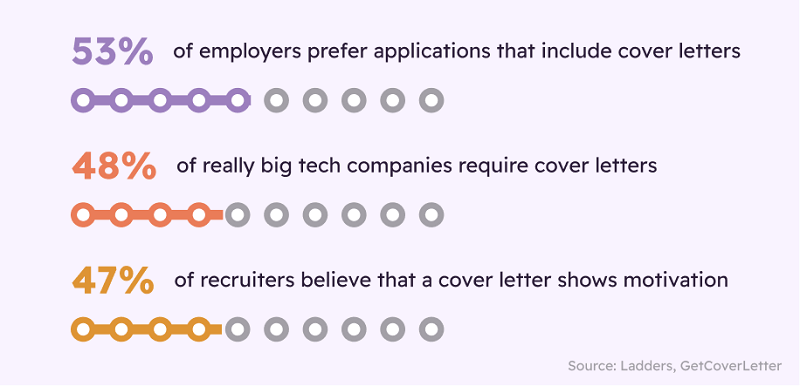
Tips to Prepare a Perfect Cover Letter
1. do your research.
A cover letter is an opportunity to tell a potential employer why they should hire you. So it should be tailored for each job and company.
The first task is to research the company and role, including the person reading your cover letter. It’s not always the hiring manager. Try to find out what they’re looking for in an employee and how their organization operates.
This will give you insight into what’s important to them in an applicant. Also, take some time to think about how today’s job market differs from that of several years ago. That can help you fine-tune your cover letter. It doesn’t matter if the change is small. It can make a huge difference.
2. Tailor Your Cover Letter to Each Role
The first and last thing you want to do is address the person reading your cover letter. Then, when applying for a job, read up on the company and find out who the hiring manager is. If there’s no name listed in the job description, call or email someone at the company to ask whom you should address it.
If there are multiple people responsible for hiring decisions, make sure to address each one individually. For example: “Dear [Hiring Manager],” “ To Whom It May Concern: ” and “Hello Mr./Ms.[First Name]. ‘
3. Don’t Let Your Resume Appear in Your Cover Letter
The primary purpose of a cover letter is to highlight and sell your qualifications. Your resume is the place where you list everything you’ve done. So don’t repeat that information in your cover letter.
Instead, do the following:
- give a brief overview of your qualifications,
- why they make you a good fit for the job, and
- how they relate to the position requirements listed by the company.
Related: How to Address a Cover Letter Without a Name
4. Be Clear and Concise
Be clear and concise to get the most out of your cover letter. One page is okay if you can; you don’t need to use up all the space. If you have more than one page, use bullet points rather than paragraphs. That makes it easier to skim through quickly.
Your tone should be professional throughout. Also, avoid using too many buzzwords, if any, as they tend to be taken seriously if used sparingly.
Finally, consider adding an “about me” section near the end of your letter. You can use that section to list relevant information about yourself that doesn’t fit anywhere else in your application. For example, employment history, educational background, or volunteer work.
5. Avoid Gimmicks, Like Weird Fonts and Drawings
Have you seen some cover letters that looked like a child wrote them? Or that included a drawing of the applicant’s pet cat? Cover letters are not the place to do that; avoid these gimmicks.
They will not help you get the job. In fact, they can do more harm than good by making you seem less professional. It can overshadow your best qualities as an employee.
Try to avoid using standard intro like “My name is [your name], and I am applying for the [position] at [company].” This is not original or creative; it’s uninteresting to read.
Instead, personalize it: “Hi, [name], My name is John Doe, and I’m applying for the Marketing Manager role at ABC Company.”
Having a friendly title will help establish rapport between readers. But don’t be too casual or informal. You want to keep things professional so that they can see how well you’ll fit in with their team or company culture if hired.
6. Use Action Words to Highlight Your Accomplishments
Use action words that highlight your accomplishments and experiences. For example, try using phrases like “increased sales by 55% within 6 months.” Or “led team through a project from concept stage to completion within two weeks.”
This way, even if someone doesn’t remember everything about you, these phrases will help them know whether or not you have what it takes.
7. Don’t Make It All About You
Don’t make the mistake of making the cover letter all about you. Instead of boasting about a skill, talk about how that skill can help the potential employer.
How are you the perfect fit for the company? How will you contribute to the company’s success? And what have you done or will do to help the company? Answer these questions in your cover letter.
8. End Your Cover Letter with Enthusiasm
You may be well qualified and rightfully confident in your abilities. But employers still want to know that you’ll be a motivated and enthusiastic employee.
So, remember to end your cover letter with enthusiasm. This will show your interest in the position and willingness to work hard and passionately if hired.
You have a greater chance of being employed if you are enthusiastic. And you’re also far more likely to stay on board over the long term. So it makes sense that 71% of CEOs believe that employee engagement is essential to the success of their company.
As a result, often, the only factor distinguishing two equally qualified candidates is their level of passion and zeal for the job.
Check our guide on how to write a cover letter for more in-depth details.
Why Is a Cover Letter Important?
Your cover letter gives the hiring manager a chance to know you better. In addition, it’s an opportunity for you to show off your writing skills and make yourself stand out from the crowd.
You can also use it to sell yourself, highlighting why they should hire you, not someone else.
Because there are so many applicants for every open position, employers have less time and resources to read through them. So it’s up to you to make sure that yours stands out from the rest.
The best way is by using a well-crafted cover letter that showcases how great an employee you’ll be if given a chance.
When Can You Skip a Cover Letter?
If you’re applying for a job that doesn’t require a cover letter—say, an internship—you can skip it. In fact, many employers will be quite clear in their postings when they don’t want to see your cover letter.
If the company does not specifically state that it wants a cover letter, you can assume it’s unnecessary. Sometimes, job listings or job descriptions don’t mention a cover letter. But it has all the other required materials, like a resume and references.
In such a situation, submit those documents without attaching additional materials such as your cover letter or résumé summary statement.
Cover Letters Alone Can’t Get the Job Done
You want to make sure you don’t let your employer down before they even meet you. In fact, without a cover letter, you might not even have the chance to meet them. Most recruiting managers expect to receive a cover letter from you.
It helps them get a sense of who you are and decide if you’re a suitable fit for the position. However, you can’t rely solely on a cover letter to get a job. It’s not an alternative to a resume nor an excuse for poorly prepared or formatted documents.
Also, there’s a difference between cover letters and resumes . Knowing the difference can help you craft the perfect cover letter or resume.
A good cover letter does have some value, though: briefly introducing yourself and explaining why you’re applying for the position. It also helps make your application stand out from the competition.
So, are cover letters necessary in 2022? Yes, if you want to stand out from the crowd of applicants. That said, your resume and online presence are enough to get noticed by recruiters these days.
But a well-written cover letter could give you an edge over other candidates.
A good cover letter will show that you care about the position and want it more than anyone else. And that makes all the difference when it comes to hiring decisions!
One thought on “ Are Cover Letters Necessary? Do You Need One in 2023? ”
Well I definitely enjoyed reading it. This post provided by you is very constructive for accurate planning.
Leave a Reply Cancel reply
Your email address will not be published. Required fields are marked *
Save my name, email, and website in this browser for the next time I comment.

How To Write a Cover Letter in 3 Easy Paragraphs
Application Materials Career Center Career Services Interviewing Job Search
Although you might have written a resume before, cover letters can be a bigger mystery. The good news is: by following a simple, three-paragraph process, you can quickly write a cover letter that will get attention and likely lead to a job interview!
What Is a Cover Letter?
Imagine you’re handing your resume to someone in person. Maybe you’re at a job or career fair, going into an employer’s office, or even handing it to an acquaintance so that they can get it to the hiring manager. You wouldn’t just give that person your resume, turn, and walk away without saying a word. You would probably take the time to introduce yourself and explain why you’re giving that person your resume, how you found out about the job, and why you think you’re qualified for it.
That’s the purpose of a cover letter .
The cover letter is a more personalized introduction than your resume. It’s a message that represents what you would otherwise say in person, face-to-face. It should be uniquely written for each company and position, follow a standard; one-page business letter format, and consist of three to four paragraphs. If possible, it should also include the hiring manager’s name.
The cover letter usually accompanies a resume. It allows you to expand on the information in the resume or explain something that might appear as a red flag or barrier to employment. However, just as important is that the cover letter allows the recruiter to assess your written communication skills!
Why Do I Need a Cover Letter?
Cover letters aren’t always required for a job application. Often, they’re listed as an optional document. Most applicants won’t submit a cover letter because of this (let’s face it, job applications can take a lot of time!). However, this also means that submitting a cover letter is an extra step that will help you to stand out from the other applicants — and show how interested you are in the position!
How Do I Write a Cover Letter?
Here’s how to write a cover letter in three easy paragraphs:
Paragraph 1 (About You)
This is where you briefly introduce yourself, what position you’re interested in, and how you discovered it (i.e., job posting site, flyer, social media). If someone recommended you for the position, drop their name in the very first sentence and include their title and affiliation.
Also be enthusiastic! List three of your most important or impressive qualifications from your resume to explain why you’re applying for the position. You may also wish to include the degree or program you’re currently studying.
Example: I’m applying for your Human Resource Specialist position found on LinkedIn, as recommended by John Smith, your Office of Human Resource Manager. I would be a valuable addition to your team, with my five years of administrative experience, BAS in Organizational Management, and Microsoft Office certification.
Paragraph 2 (About the Company)
Answer the question “Why do you want to work here?” by researching the company and writing about at least one way that you resonate with its culture, values, or mission. You can get great information by visiting the company’s website (check the About Us or Mission/Vision pages) or by looking them up in the news category of your favorite search engine. Emphasize how your experience meets the company’s needs and why it would be a privilege to work for them.
Example: Congratulations on your team participating in a local Habitat for Humanity build. I would love to work for an organization that is so committed to improving our local communities. I’ve personally participated in four Habitat for Humanity builds; the skills I’ve learned, coupled with the knowledge I gained, have inspired me to seek out other, similar volunteer opportunities within our community.
Paragraph 3 (Thank You and Closing)
Be sure to thank the employer/hiring manager, provide contact information, and mention that you look forward to hearing from them. Express enthusiasm about an upcoming interview!
Example: Thank you for your time and consideration. I look forward to discussing my professional experience in greater detail in an upcoming interview. You can reach me at [phone number] or [email address].
Is There a Cover Letter Template I Can Use?
Microsoft Word has many attractive and pre-formatted cover letter templates you can use. Simply open Microsoft Word, click new, and then search for “cover letter” to browse all the options.
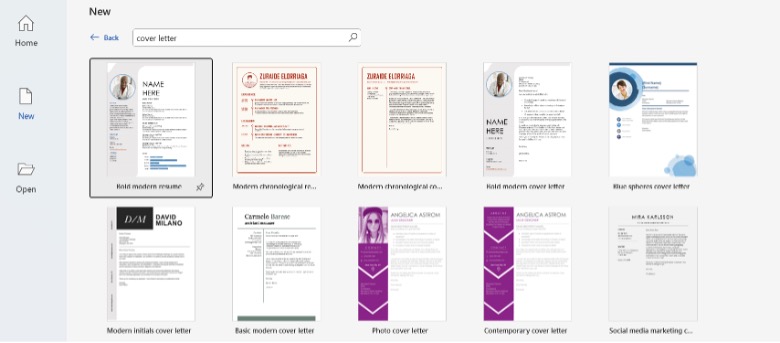
You can also use this cover letter template sample for reference:
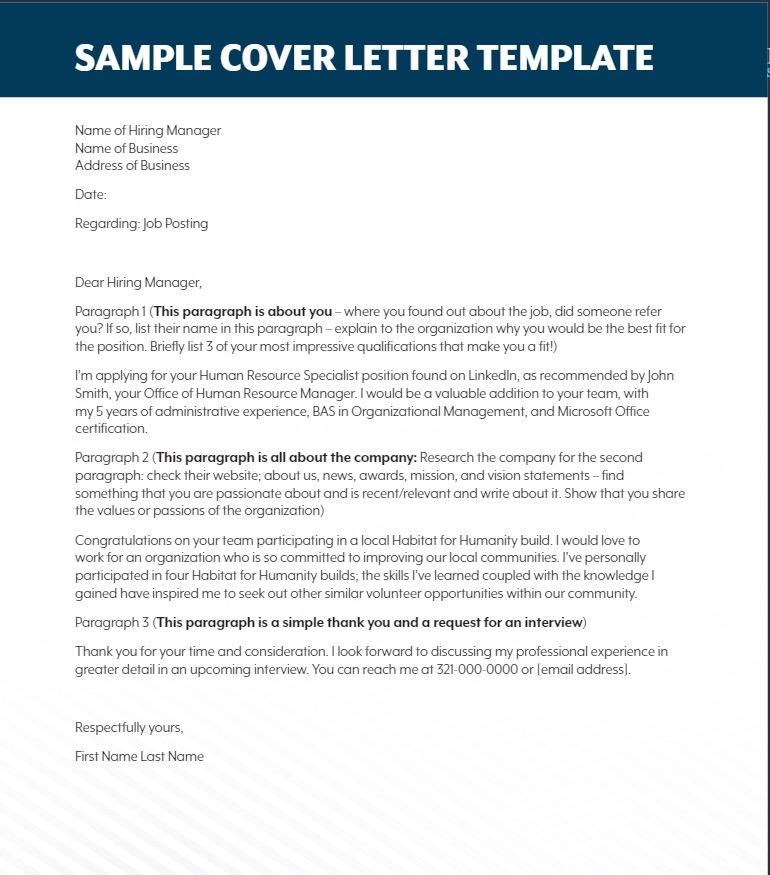
Who Can Help Me Write a Cover Letter?
Eastern Florida State College’s Career Services team is here to assist! Did you know you can schedule meetings with an EFSC Career Services Coordinator to get help writing a cover letter?
Whether you have questions about your career path, job hunting, or interview preparation, you can contact your campus’ Career Services Center for personalized assistance or check our our upcoming events . We look forward to helping you succeed this semester and beyond!
- Recent Posts
- Every Student Needs Career Services: An Interview with Heather Allen - May 8, 2024
- Leave Your Legacy (Paver) at EFSC - April 24, 2024
- 5 Anime To Watch in College - April 10, 2024
Related Posts

Finding Your Balance: Navigating School, Work, and Social Life at EFSC

Yes! Social Media Can Boost Your Career!

I Submitted the FAFSA. What’s Next?
- REQUEST INFO
- The D.C. Brief
Calls for Biden to Step Aside Are About to Get Deafening
This article is part of The D.C. Brief, TIME’s politics newsletter. Sign up here to get stories like this sent to your inbox.
For Democrats who tuned into Thursday night’s debate looking to calm their worries about President Joe Biden’s age and acuity, they came away with zero remedy. Within 10 minutes of the CNN-hosted event’s start, some of even Biden’s most loyal supporters found themselves asking if the nomination was, in fact, settled.
How bad was it? Vice President Kamala Harris rushed to join the clean-up, booking late-night cable appearances.
“Yes, there was a slow start but a strong finish,” said Harris, whose prospects for replacing her boss on the top of the ticket were getting hard scrutiny in real time as the debate unfolded. “Listen, people can debate on style points, but ultimately, this election and who is the President of the United States has to be about substance, and the contrast is clear,” she said on CNN in a show of unity with her boss.
At times jarring and deserving of double-takes, the evening left Democratic insiders gobsmacked . His campaign team tried to mask the disaster but there was no denying things did not go as planned. And with a painful 53 days until Democrats have their next big night in front of a national audience with the opening of their nominating convention in Chicago, the fumbling impression left Thursday evening is going to be the image that endures for a stretch.
Biden has faced pivotal nights like this before, the most analogous being his March State of the Union. Then, as now, voters were looking more at Biden’s performance than substance. The fears about the President’s capabilities faded somewhat when Biden nailed that performance. No one would say anything close to that on Thursday.
At times seeming to seize up and at others appearing confused, Biden rambled his way through a 90-minute session against former President Donald Trump. While it evened-out as the night progressed and Biden loosened up, the initial burst of anxiety among Democrats was not the prototypical bed-wetting that the President’s inner circle has proven adept at brushing off. The split-screen was impossible to ignore: Trump was not only more restrained than is typical for him, but he looked steadier even as he dodged specific questions in favor of populist platitudes.
Read more : Trump’s Debate Strategy Was to Let Biden Bury Himself
Biden took the stage with small, slow steps. He often steadied himself with both hands on his lectern. He looked down during some uncomfortable moments, appearing to zone out. And some of his answers veered wildly away from their intended marks, such as his invocation of Americans murdered by those in the country illegally. The question in play? About abortion rights.
"I spent half my career being criticized for being the youngest,” Biden said when asked directly about his age. Then, unprompted, he started talking about computer chips. “This guy is three years younger and a lot less competent,” he said of Trump.
There are some facts that no performance—even a flawless one—can erase or reverse. These are the two oldest presumptive nominees in history. The presidency takes a toll on everyone, and both men moved into the Oval Office as not-young men. At the time of their first head-to-head debate in 2020, they seemed like patrician party elders trying to steady a nation wrecked by a pandemic. Four years have not helped either look younger, and there is no denying that Biden, in particular, looks a little less steady, his voice a bit thinner, his jabs a little duller. Certainly, this Biden is not the man who stopped the panic inside Democratic circles in 2012 after Barack Obama’s objectively terrible first debate against Mitt Romney.
The stakes for such an evening are always high. Americans are facing a choice between an 81-year-old sage with a literal senatorial vein and forgetful streak or a 78-year-old blowhard dragging behind him felony convictions and looming indictments. At the core of the decision is one posed by Ronald Reagan in the lone debate of the 1980 presidential race: “Are you better off today than you were four years ago?”
Read More : Our Exclusive Interview with President Joe Biden
The debate comes at a moment of a tight campaign, with Trump narrowly leading in most national polls and sitting stronger in the handful of states that will ultimately decide the race. Trump has narrowed Biden’s fundraising advantage and seems to have paid no real price for his 34 felony convictions in New York. And, it’s not exactly a secret even among Biden’s biggest defenders that the incumbent needed to knock it out of the park on Thursday .
"I really don't know what he said at the end of that sentence. I don't think he knows what he said either,” Trump said in an early moment that thwacked hard. “We’re trying to justify his presidency,” he said later.
Biden’s showing did little to remedy that reality. Message chains among Washington Democrats devolved as the night unfolded into crippling anxiety. “Unintelligible must have been the [closed captioning],” one senior Democrat strategist mused. “It would have been the most honest.”
Panic is not too strong of a word to describe some of those conversations . More than a few text chains were asking who knew the Democratic National Committee rules about how a nominee is locked in. Every elder strategist who still hopes to be part of the Biden orbit seemed to have found themselves on flights Thursday evening, unable to comment because they claimed they weren’t even watching.
Trump is, at his core, a showman with few beliefs of his own. Biden, who has a half-century of debating under his belt and spent a week secluded at Camp David practicing for the debate, did not put on a matching spectacle. Instead, Biden tried to prosecute the fact-based case against Trump while his predecessor danced around the specifics and hurled invective back across the eight-foot gap between the men.
“He gets paid by China. He’s a Manchurian candidate,” Trump said.
A cheap shot, sure. But it’s one that rings much louder than almost anything Biden had at the ready.
“If he wins this election, our country doesn’t stand a chance,” Trump said, reverting to vague warnings.
A disturbing echo of that sentiment kept coming through: if Biden remains the nominee, Democrats might not, either.
There were still small reasons for Democrats to hold out hope, however faint. Trump remains a petty figure who continues to insist the 2020 election was rigged and thus illegitimate. He continues to vow retribution against those who he thinks wronged him. “Joe could be a convicted felon,” Trump said. “This man is a criminal.” And Trump—who is a convicted felon—continued to hurl inaccurate statements and fling innuendo all while flagrantly misrepresenting his own histories.
"The only person on this stage that is a convicted felon is the man I am looking at right now,” Biden said.
Biden also tried to fact-check Trump and landed some rehearsed barbs. “You have the morals of an alley cat,” Biden said in one honed line, ticking through a litany of Trump’s history.
But Biden’s rejoinders were no match for Trump’s antagonism. It was clear Biden had prepared, but he suffered from the curse of someone who memorizes a script without understanding any of its subtext. To summon the words he hammered home, he often appeared to be staring off into space.
Trump, meanwhile, just showed up and was himself with a coded appeal to his base supporters.
“You’ve destroyed the lives of so many people,” Trump said, accusing Biden of ruining the lives of innocent individuals connected to the Jan. 6, 2021, attack on the U.S. Capitol. He continued to insist that the protestors who sacked Capitol Hill were escorted in by police. And, despite overwhelming evidence to the contrary, Trump continued to indulge in the Big Lie that he had actually won but the results were rigged.
“There’s no evidence at all,” Biden said.
He was right. But that’s the norm when it comes to Trump. What isn’t the norm—at least not to most Americans—is seeing a President seeming to sleepwalk through 90 minutes of live television.
Make sense of what matters in Washington. Sign up for the D.C. Brief newsletter .
More Must-Reads from TIME
- Welcome to the Noah Lyles Olympics
- Melinda French Gates Is Going It Alone
- What to Do if You Can’t Afford Your Medications
- How to Buy Groceries Without Breaking the Bank
- Sienna Miller Is the Reason to Watch Horizon
- Why So Many Bitcoin Mining Companies Are Pivoting to AI
- The 15 Best Movies to Watch on a Plane
- Want Weekly Recs on What to Watch, Read, and More? Sign Up for Worth Your Time
Write to Philip Elliott at [email protected]
Are you seeking one-on-one college counseling and/or essay support? Limited spots are now available. Click here to learn more.
How to Answer “Tell Me About Yourself” with Examples
June 30, 2024

You’re sitting down for your interview and the interviewer says, “Tell me about yourself.” What’s the first thing you think of when you hear those words? It’s a question about who you are, so it’s bound to be easy. Right? “Tell me about yourself” is often the very first thing you’ll hear during your interview. After all, you and the interviewer are both new to each other. What they do know about you so far consists of details on your resume, cover letter , or possibly, already, recommendations. They’re posing this question to get to know you as a person, and you’ll most likely be asked this for every new interviewer you have, from the first introductory screening up until the very last interview with the head of the department. Let’s dive into the very nature of this question and explore how to answer “Tell me about yourself” (examples below) successfully.
Why do they need to hear my answer when they already have my resume and cover letter?
Just as you’re figuring out who your interviewer is, your interviewer is doing the same. The interview will begin with friendly small talk to get you both situated. “Tell me about yourself” then becomes a way to ease into the rest of the interview. It can help inform the interviewer on how to steer the next questions.
What you say can catch enough of their interest to ask a relevant question. Or they’ll move on from it. The details and the story you choose to share will help them assess what types of questions they should ask you. Throughout the entire time, they are noticing what makes you different from other candidates.
Other ways they’ll ask “Tell me about yourself”
During the interview, you could hear those exact words, or the interviewer can say:
- “Tell me a bit more about your background.”
- “Could you summarize your most important achievements?”
- “I’m going through your resume, but would love for you to walk us through it.”
- “I already looked at your resume and cover letter, and it’d be great to know more about who you are.”
- “Describe your journey so far.”
- “Is there something unique you’d like to share about who you are?”
It’s challenging to decide how to answer “Tell me about yourself” because you need to be confident about the examples you’re choosing. Much like a personal statement, you’re giving them a snapshot into your life. You’re in control of what you choose to say.
Know how to answer “Tell me about yourself”
Choosing the right parts of your life to talk about can pave the way for a successful interview. Let’s dive into the key points you should cover:
1)Talk about the experiences, achievements and skills you have that are relevant to the job. This then leads into how you would be the best candidate for the position.
2) Explain the previous jobs you’ve held and how that led you to your current one. Then go into how your current job has brought you to this new role you are applying for. This can also be a good opportunity for you to mention what your goals are in the future.
3) Show your personality while you’re speaking, making sure you’re communicating clearly and positively, while giving examples of how you’ve connected with people throughout this time. Presenting this proactive side of you will only strengthen your profile.
4) Demonstrate what you’ve researched about the company by explaining how you see yourself in the job. Share about what you’re most looking forward to in the job and the company.
“Tell me about yourself” in the past, present and future
Finding the right flow in relaying your own narrative can be a tricky task. It’s helpful to have a general format of which times of your life you’re pulling your examples from.
Two recommended ways of how to “tell me about yourself” in an organized format are:
1) Present – Past – Future
- You can begin by describing what your current job entails and what your responsibilities and accomplishments are. Then you can share how you got to where you are with your current job, which will lead you to describe more of your professional background. To conclude, you’ll then talk about what your goals are and why you’re so interested in this new position.
2) Past – Present – Future
This format would have you begin with how you arrived at your current job, giving you a chance to explain your professional history right away. You can also mention what has always inspired you to become who you are today. This leads right into what you do in your current role, what responsibilities you have and what achievements you’ve accomplished. Then you’ll finish off, just like the “tell me about yourself” format above, with why you’re the right person for this new job.
Tell me about Yourself Examples (Continued)
There’s no “fixed” order for how to tell this to your interviewer, but it’s important to choose the examples that highlight your best skills and attributes relevant to the new job. What’s most crucial is to always tie it back to the new job and the new company you’re applying to. This means that if your past work experience ties more directly to the new job, then it makes sense to begin there. Similarly, if your most recent work experience is more related to the new role, then you can start with that example.
The interviewer is there to assess whether or not you’re the ultimate fit for their team. In that sense, it’s always helpful to end your “tell me about yourself” story with why you’re the right person for the job.
Key advice for “Tell me about yourself” answers
Now you’ve got a general timeline structure set in place. But before we dive into “tell me about yourself” examples, let’s look at some quick ways to strengthen your response:
1) Your first impression will make a difference.
2) You are your own curator.
3) Understand who your interviewer is.
4) Remember this is a professional interview.
5) Tone can influence the entire conversation.
6) Stay focused: everything should point towards the new job.
7) Be authentic but prepared.
8) Speak with positivity and enthusiasm, but don’t overdo it.
“Tell me about yourself” examples
Every “tell me about yourself” answer will be different depending on the person, but having some examples on hand can help. Take a look at these examples below that make for a strong answer.
1) You are applying to a completely new industry:
For over seven years, I’ve worked in business development and have focused on building longstanding relationships with clients. My most recent role was as the senior manager for a startup tech company that ran a database platform for journalists around the world. I helped connect the right partners to our company and promoted our mission on global trips across Africa, Asia and Europe. Now I’m interested in branching outside of business development and stepping into fundraising to broaden my scope. Fundraising is a field I’ve worked very closely alongside throughout my career and have always found fascinating. I’ve been wanting to join a team where I could apply my business development skills into a fundraising leadership position, and this is why I’m so interested in this role at your company.
How to Answer “Tell me about Yourself” Examples (Continued)
2) If you are searching for a similar job to the one you have now:
Since I was in college at the University of Michigan, I’ve been absolutely passionate about journalism and media . As you can see on my resume, I was the editor-in-chief of our student newspaper and I helped to create an incubator on campus for students who wished to become investigative journalists. This only spurred my love for journalism, and upon graduating, I began working as an intern at the Los Angeles Times, assisting some of the lead journalists covering politics across the Southern Californian region and eventually being able to help write and edit copy for newsletters.
I worked my way up to become an assistant editor, which made me fall in love with the editorial process and editing for a large newspaper. After working as an assistant editor for the past three years, I knew I wanted to start finding work as an editor. With what I’ve learned as an intern and assistant editor at the Los Angeles Times over the past several years, I always imagined myself covering news back home in Michigan. When I saw this opening for the editor position, I knew I had to apply because it’s been a dream of mine to work with your company.
3) Maybe you are going from an agency to an in-house position:
I’ve been an account manager at Paris Parties for five years now, and I’ve been responsible for overseeing our top client accounts. I’ve established long-lasting relationships with each of Paris Parties’ biggest clients, as going above and beyond for our client has always been my first priority. Prior to Paris Parties, I worked at Hollywood Events, where I managed over 50 of their largest clients across the creative sector. I always loved the work I did as an account manager at both agencies. But I’ve been looking for a new challenge, to step into more of a leadership role, so as soon as I saw the opening at your company, I knew I had to go for it.
4) You’ve just graduated and you’re applying to your first job
I graduated from New York University in May, and I majored in English and American literature and minored in Spanish. I always knew that I wanted to work in a nonprofit organization that helped promote literature around the world. Throughout my time at NYU, I volunteered and interned at several nonprofits such as UNICEF, where I helped organize events for donors in New York City to help raise funding for girls’ education. One of the greatest experiences I had while interning was when my team and I were able to increase our donations from last year by 35%, compared to the 12% the previous year.
We were able to send more books and educational materials to girls around the world who otherwise would have not had access to these resources. It made me wonder what else I could do with my English literature degree, my foreign language skills and my passion for education. I wanted to truly make a difference. Since then, I became passionate about fundraising for children’s rights and access to education, which is what led me to apply for the associate fundraiser role at your organization.
5) Searching for a new role in the healthcare sector:
My work experience in customer service had unexpectedly led me to pursue a career in the healthcare sector . Working as a waitress for three years made me understand how to listen to the needs of people. When I was serving a table of pediatric nurses one day, I heard them talk about their work and I knew I had to explore this field. I’ve always been someone interested in improving the lives of others, whether it’s through providing perfect customer service. After three years at the restaurant, I was promoted to restaurant manager because my supervisor noted my dedication and passion for serving others.
Every night after work, I studied on my own to see how I could enter the healthcare industry as an administrator. And that’s how I went back to school. Upon graduating, I began to build my career in health administration, working my way up to get to where I am today at Mountainview Hospital. I’ve been overseeing the office and managing staff and patient relations for nine years now.
This past April, I worked with the interns and senior management to create a “career day” to bring our office closer together. It has been an immense pleasure to hold our weekly meetings and regularly involve the IT team to ensure our computer systems are all up to date. As it’s now the end of my ninth year at Mountainview Hospital, I’ve been searching for new ways to branch out, grow and contribute. And I was incredibly interested when I learned about this position at your hospital.
6) If you’re looking to change careers:
For over a decade, I’ve worked in marketing as a marketing director, leading campaigns and amplifying my current company’s messaging through high-level engagement. Throughout the past five years, I’ve been leading a team of fifty in our marketing department to reach and surpass our monthly, quarterly and yearly goals in ROI. It has been one of my greatest joys to watch the employees under my care grow into the professionals they are today, and it’s always fulfilling to see such professional and personal development. I’ve thoroughly enjoyed watching my team work across departments to ensure that we meet our goals, and especially, working closely with the public relations department.
Since I first came to my company as a marketing associate, I learned quickly how intertwined the marketing and public relations teams are, and I’m incredibly grateful to have had the career in marketing that I’ve managed to build. The more I worked with our public relations director, the more I also realized that I’ve gravitated towards developing more creative, media-facing solutions to campaigns for the company. Together, we were able to create significant events and turnarounds for our entire team, and I found myself eager to focus on media strategies and improving our company’s public image. After much consideration, and with our public relations director’s recommendation, I know that making this switch into public relations is the path I’m now meant to pursue. And I can’t think of a better place to work for than your company, which combines the best of both worlds.
Show them who you are
So where do you even start? How much should you actually say about yourself in an interview? Prepping for the inevitable “Tell me about yourself” can be a stress-inducer, especially for a job with a heavy workload. But it doesn’t have to be, even if you’re applying for one of the happiest jobs in America . Hopefully, with the information shared above, you’ll now have a better idea of where to begin.
Remember, you don’t want to share with the interviewer every single detail from your professional life. However, you do want them to know about certain experiences that have shaped you to be the professional you are today. Striking the right balance is key.
How to Answer “Tell me about Yourself” Additional Career-Related Resources
- Sample Resignation Letter
- How to Reschedule an Interview
- Condolence Messages for a Coworker – 60 Samples

Joanna Hong
With a BA from Pitzer College and an MA from University College London, Joanna has worked in London, Berlin, and Los Angeles covering many cultural and political issues with organizations such as Byline Media, NK News, and Free Turkey Media. A freelancer for The New York Times, her work has also appeared in Newsweek, Dazed and Confused Magazine, and The Guardian, among others. In addition, Joanna was the recipient of the 2021 PEN America Emerging Voices Fellowship in Fiction and is currently completing her first novel.
- 2-Year Colleges
- Application Strategies
- Best Colleges by Major
- Best Colleges by State
- Big Picture
- Career & Personality Assessment
- College Essay
- College Search/Knowledge
- College Success
- Costs & Financial Aid
- Data Visualizations
- Dental School Admissions
- Extracurricular Activities
- Graduate School Admissions
- High School Success
- High Schools
- Homeschool Resources
- Law School Admissions
- Medical School Admissions
- Navigating the Admissions Process
- Online Learning
- Outdoor Adventure
- Private High School Spotlight
- Research Programs
- Summer Program Spotlight
- Summer Programs
- Teacher Tools
- Test Prep Provider Spotlight

“Innovative and invaluable…use this book as your college lifeline.”
— Lynn O'Shaughnessy
Nationally Recognized College Expert
College Planning in Your Inbox
Join our information-packed monthly newsletter.
I am a... Student Student Parent Counselor Educator Other First Name Last Name Email Address Zip Code Area of Interest Business Computer Science Engineering Fine/Performing Arts Humanities Mathematics STEM Pre-Med Psychology Social Studies/Sciences Submit

IMAGES
VIDEO
COMMENTS
A cover letter is an introductory document many employers ask you to submit along with your resume when applying for a job. Depending on the company, you might need to email your cover letter and resume or there may be an online application process where you can upload it. Many job listings specify if they require a cover letter, but some don't ...
Why cover letters can be important A cover letter gives you the chance to highlight anything on your resume in more detail, as well as to point out your special qualifications for the open position. A resume documents your skills, education and experience. With a cover letter, you can make the connection between the resume and the job.
The cover letter can show a potential employer that you are not only qualified but that you have excellent written communication skills. Here are a few reasons why a cover letter is important: It tells your story The cover letter is an opportunity to introduce yourself and your story before your first interview. While you get the chance to ...
Yes, you do need a cover letter in these common situations: The job description requests or requires a cover letter. You have a referral for your cover letter. The job requires strong writing and communication skills. Even if the job description says "cover letter optional", it's still important to write a great cover letter and attach it ...
The cover letter needs to show the employer you can meet the job requirements, why you want to work at the company, and who you are. Include an anecdote about your experience that shows how you ...
Do I Need a Cover Letter For My Resume. Short answer: yes, you should submit a cover letter alongside your resume. Here's why: Most job openings require you to submit a cover letter. Recruiters might not have the time to read ALL the cover letters they receive, but they will definitely read cover letters if they're on the fence for a candidate.
Step 3: Address your cover letter to the hiring manager—preferably by name. The most traditional way to address a cover letter is to use the person's first and last name, including "Mr." or "Ms." (for example, "Dear Ms. Jane Smith" or just "Dear Ms. Smith").
The cover letter is a contender for job seekers' most hated part of the job search. Personally, when browsing job boards, I've always gravitated toward the postings that said "cover letter optional" or didn't mention one at all—and I'm a writer.When you're deep in a job hunt—particularly one where you feel like you're throwing applications into a black hole—cover letters ...
With your cover letter, you'll aim to: Highlight your qualifications: You'll show how your skills and experience relate to the employer's needs for a specific position. Showcase your motivation: You'll demonstrate your enthusiasm for the specific position and the organization. Reflect your voice and written communication skills: You ...
To start your cover letter, introduce yourself. This means including your full name, your specific interest in the position and the reasons you've chosen to apply. If you got a referral to the job from another party, ensure to mention this in the first paragraph. 2. Mention your skills and qualifications.
Do I need a cover letter for my resume? If you're an active job seeker, you've likely asked yourself this question before. Of medium-sized companies, 55% require cover letters in job applications, yet 58% of professionals think they are unnecessary. Despite conflicting statistics, writing a cover letter when applying for a job is a good idea — cover letters help showcase the ...
A great cover letter consists of the following components: 1. Your name and contact information in a header. The hiring manager needs to have your contact information. Without these details, they have no way of inviting you for an interview. The most eye-catching way of adding your contact information to your cover letter is by creating a large ...
A cover letter serves as an introduction to your résumé and is written with a specific job in mind. The main role of a cover letter is to introduce yourself to the employer and encourage them to read your résumé. It also aims to show them that you are the right person for their business. Your cover letter should outline your qualifications ...
Here are some benefits of including a cover letter in your job application: 1. They showcase your personality. Cover letters typically reveal insights into a candidate's values, character traits and outlook on work. Many hiring managers prefer candidates who align with the organization's culture, so highlighting your unique personality in your ...
A cover letter accompanies your CV as part of most job applications. It provides the hiring manager with further detail on how your skill set aligns with the role, what you can bring to the team and why you want the position. Cover letters also allow the recruiter and hiring manager to develop a better understanding of your suitability for a ...
When applying for a job directly to an employer, use a cover letter that is well-personalized, tells impactful career stories, conveys your motivations for the role, and speaks to why you want to ...
Yes, they almost always are. 83% of recruiters agree that knowing how to write a cover letter and sending one is crucial. It gives you the opportunity to demonstrate that you are a great fit for the company you are applying for. A cover letter is important as it boosts your chances for a job. There are many contrasting opinions on that matter ...
Yes, in most cases. What you should know about cover letters is that they're optional for some jobs. For example, your resume alone will likely be enough if you apply for an internship or a low-level assistant position. However, let's say you're applying for a higher position, like an executive director position.
Why Do I Need a Cover Letter? Cover letters aren't always required for a job application. Often, they're listed as an optional document. Most applicants won't submit a cover letter because of this (let's face it, job applications can take a lot of time!). However, this also means that submitting a cover letter is an extra step that will ...
So let's talk about how to do cover letters right., First, understand the point of a cover letter., The whole idea of a cover letter is that it can help the employer see you as more than just ...
A cover letter is important and required if the job offer requires a cover letter, the employer, hiring manager, or recruiter requests one, you're applying directly to a person and know their name, or someone has referred you for the position. So if you're wondering whether you should include a cover letter, the answer is yes in most cases.
Middle paragraph (s) Closing paragraph. Letter ending and signature. Your cover letter should be one page long and use a simple, professional font, such as Arial or Helvetica, 10 to 12 points in size. Your letter should be left-aligned with single spacing and one-inch margins. Show Transcript.
And yes, including a cover letter can help differentiate you from other candidates. ResumeLab says 83% of HR professionals think cover letters are essential during hiring decisions. And over one-third (36 percent) of hiring professionals start the evaluation process with a cover letter.
This article is part of The D.C. Brief, TIME's politics newsletter. Sign up here to get stories like this sent to your inbox. For Democrats who tuned into Thursday night's debate looking to ...
Why do they need to hear my answer when they already have my resume and cover letter? Just as you're figuring out who your interviewer is, your interviewer is doing the same. The interview will begin with friendly small talk to get you both situated. "Tell me about yourself" then becomes a way to ease into the rest of the interview.
A cover letter is a professional document that candidates provide to employers in combination with their resume and other details for a job application. Cover letters act as an extension of your resume and provide employers or hiring managers with more in-depth information about how your qualifications align with the job in question.
With its immunity ruling on Monday, the Supreme Court granted former President Donald Trump's wish of all but guaranteeing that his criminal trial for trying to overturn the 2020 presidential ...
A cover letter is a short introduction to you that concisely communicates your interest in a job opportunity along with your top skills and relevant experience. It's important to customize your cover letter for each role to demonstrate that you've researched the organization's mission and values. — Genevieve Northup, MBA, SHRM-CP, HCI-SPTD.
Before adopting the final rules, the Commission considered more than 24,000 comment letters, including more than 4,500 unique letters, submitted in response to the rules' proposing release issued in March 2022. The adopting release is published on SEC.gov and will be published in the Federal Register. The final rules will become effective 60 ...